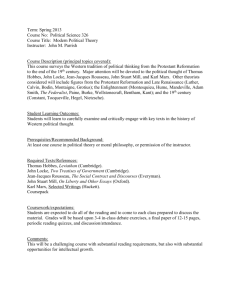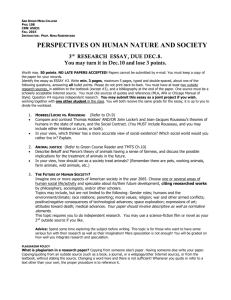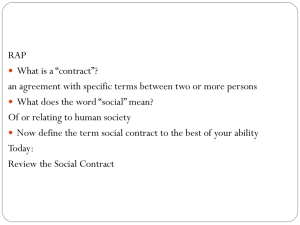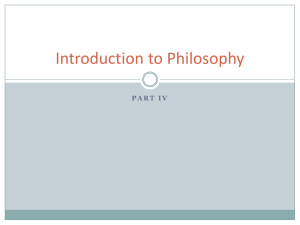Continue on State of Nature
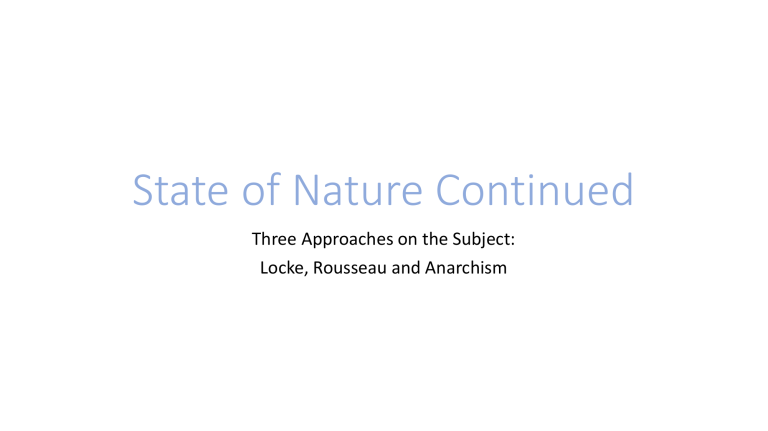
State of Nature Continued
Three Approaches on the Subject:
Locke, Rousseau and Anarchism
Who is John Locke?
Lived between 1632 –1704.
He was an English philosopher and physician regarded as one of the most influential of Enlightenment thinkers.
He is widely known as the Father of classical liberalism.
Locke's theory of mind is often cited as the origin of modern conceptions of identity and the self, figuring prominently in the work of later philosophers such as Hume, Rousseau and Kant.
He opposes Hobbes’ notion that state of nature is state of war.
He thinks that is a mistake.
He believes that it is possible to live a life without presence of a government authority.
For him, state of nature is a perfect state of freedom and equality.
Law of nature determines boundaries - domain of life not laws of a particular government.
Nobody is above someone else. Everybody is equal. This is a given.
No one is appointed by God to rule others.
He indicates that laws are made so that no one harms another in his life, health, liberty, or possessions.
He strongly believes in God. He thinks that although there is no superior on earth, there is one in heaven.
The law of nature for him is basically the idea that mankind is to be preserved as much as possible.
Human life and dignity is sacred.
What is morally permitted is what human kind is bound to do. And state of nature allows what is moral.
Moral duty will restrict people from harming themselves and others in the state of nature.
In the state of nature, there must be a way of enforcing the law. Who will enforce the laws?
Locke concludes that there must be a natural right for every person to punish those who offend against the law of nature.
How do you interpret the notion that everyone should have right to punish those who harm others’ life, liberty and property?
Everyone believes in self-defense, but what is self-defense?
Law-breakers are threat to everyone. They undermine peace and safety of all.
Law-abiding citizens will come together to protect the rights of others against those law-breakers. They will find a way for necessary power to enforce the law of nature.
As Hobbes thought the scarcity of resources will lead conflict among people,
Locke thought that nature has given things richly.
There is plenty of room in the state of nature for everyone. There is no need for conflict and dispute.
Later on, Locke deviated a bit from the idea that the state of nature may not be as peaceful as he first supposed.
Then, how would we explain every society had to create its own government and state?
The primary concern for him is the administration of justice in a state of nature.
Who will perform the justice, based on what evidences and how to conduct it.
How to share the land? Turn it into money?
Take more than what you need and try to make money off it.
How is this possible in a state of nature? Who will regulate?
I wish a wolf were friend with a sheep? But, is that possible? Wishful thinking of state of nature….
Rousseau…
Who is Jean-Jacques Rousseau?
Lived between 1712 –1778.
He was a Genevan philosopher, writer, and composer.
His political philosophy influenced the French Revolution as well as the overall development of modern political, sociological, and educational thought.
He believes that human nature is not based on natural goodness, but his ideals take steps in that way.
Like Hobbes and Locke, he believes that human motivation is determined by self-preservation. But, there is more to it….
Naturally, we all feel bad to see a fellow human being suffer.
Compassionate feelings will prevent the bad from happening.
Like Hobbes, he believes that modern man who is corrupted by society, would act with greed and break the law in a state of nature.
There would be a state of war!
State of nature is impossible for him. Wishful thinking to have it, but civilized man has lost that trait.
Human developments have corrupted individuals than purifying them morally.
Notions of law, right and morality has no place in a state of nature.
Do you think that feeling sympathy for others is enough to avoid the state of war?
How about the role of greed?
How about attributes of human beings? Free will and capacity to selfimprovement?
The state of nature, for Rousseau, is the reality of prehistory; has no application in modern times.
How about needs and consumption? Aren’t we all needy?
Rousseau focuses more on innovation than what Hobbes stresses on scarcity of goods and humans taking from others.
How about cooperation rather than competition?
Isn’t there a possibility to work together and produce more; instead of taking from each other?
What is Anarchism?
Anarchism is a political philosophy that advocates stateless societies based on non - hierarchical free associations.
Anarchism holds the state to be undesirable, unnecessary, or even harmful.
The theory or doctrine that all forms of government are oppressive and undesirable and should be abolished.
Anarchism is a fact of 18 th century. Some would call it liberal socialism.
They believe that human beings, when perfected, could become highly cooperative; not aggressors.
When human kind is purified, reached its potential, the state of nature would not be a reality of distance past, but a fact of future.
Like Rousseau, anarchists believe in natural goodness of human kind.
If there were no government and authority people would be as pure as when they came onto earth!
Authority corrupted them!
Anarchism should not be dismissed easily. There are aspects that we can learn from…

